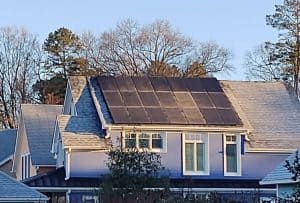
Duke Energy has reached an agreement with several North Carolina solar installers who objected to the company’s proposed changes in rooftop solar rules and incentives.
Duke Energy had sought to reduce what rooftop solar owners get paid for excess electricity sent back to the grid, known as “net metering.”
A group of solar installers objected, telling state regulators that Duke’s plan would take away an important incentive supporting the industry’s growth. They estimated it would slash 25% to 35% from the value of a home solar investment.
But after weeks of negotiations, Duke has settled with three large installers and agreed to a more gradual transition to the new rules.
If approved by state regulators, the deal would create a 15-year “bridge rate” for current solar owners and those who install solar by the end of 2026. But it also lets Duke proceed with its original plan to ultimately trim payments and add a new monthly fee for solar users.
Duke negotiated the settlement with three CEOs — Stew Miller of YES Solar, Dave Hollister of Sundance Power Systems, and Bob Kingery of Southern Energy Management.
“In the end, we did the best we could to secure the best deal possible for our industry, one that would give us a runway that was sellable to our customers, and buy some time for some systemic changes to occur that could create a better system moving forward,” Hollister said in a statement.
Duke Energy also welcomed the deal.
“Duke Energy knows that customer-sited solar is an important part of the future growth of solar in North Carolina,” Lon Huber, Duke Energy’s senior vice president of pricing and customer solutions, said in a statement. “We believe this phased-in compromise will help the installer industry navigate market changes and adapt to the long-term rate design of Solar Choice.”
Despite the compromise, Duke’s plan is still opposed by a coalition of environmental and nonprofit groups.
“After months of public and legal pressure, Duke Energy was forced to seek a compromise,” NC WARN Executive Director Jim Warren said in a statement. “If approved, however, the new proposal would still be a step backward for the solar industry and leave Duke executives trying to lock in a high-carbon, climate-wrecking future.”
